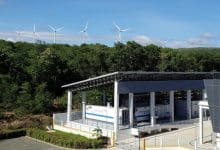FTI disappointed by the underutilisation of biomass and biogas

The Federation of Thai Industries (FTI) expressed discontent with the state’s plan to reduce biomass and biogas fuels in the upcoming power development plan (PDP). The FTI advocates for maintaining or increasing the proportion of these fuels to better utilise agricultural waste.
Scheduled for enforcement from 2024 to 2037, the PDP promotes a substantial increase in renewable power, with a significant emphasis on solar energy, while giving less attention to biomass and biogas contributions.
Renewable energy’s share is projected to rise to 51% of the total by 2037, up from 20% last year. The remaining energy mix will include gas, coal, nuclear energy, and new energy solutions aimed at reducing fossil fuel usage and conserving electricity, according to the PDP. Chairman of the FTI’s Renewable Energy Industry Club, Natee Sithiprassasana spoke on the advantages of biomass.
“It is true biomass must be burned to fuel power plants, but it releases less carbon dioxide than coal and gas.”
Biomass includes various agricultural leftovers such as rice husks, sugar cane bagasse, corncobs, unwanted palm parts, and wood chips. These plants absorb carbon dioxide and produce oxygen before becoming agricultural waste, making them valuable, according to Natee, who views the energy as beneficial to the carbon neutrality plan.
“I view them as fuels that will help speed up the government’s efforts to achieve carbon neutrality.”
Balancing emissions
Thailand has set 2050 as the target year to balance carbon dioxide emissions and absorption, aligning with international efforts to combat global warming.
Under the new PDP, the share of biomass and biogas-derived power will decrease to 1,046 megawatts (MW) and 936MW, respectively, by 2037. This is a significant reduction from the 2018 PDP targets of 5,790MW from biomass and 1,565MW from biogas.
The new targets are considered too low by the FTI, as greater use of biomass could help farmers increase their revenue, Natee noted. Using biomass as renewable fuel can add value to agricultural materials, potentially benefiting consumers with lower power bills. The tariff for electricity generated from biomass and biogas fuels is 3 baht per kilowatt-hour, which is lower than that for power derived from fossil fuels.
As of yesterday, July 11, electricity from biomass and biogas supplied to the state grid totalled 2,100MW and 300MW, respectively. The total renewable power stood at 9,821MW, according to the Department of Alternative Energy Development and Efficiency.
Biogas can be produced from wastewater from factories and animal waste in the agricultural sector. However, this type of fuel has not attracted much interest from companies participating in the auction of new power plant projects under the state renewable scheme, due to the low return on investment, reported Bangkok Post.
Natee highlighted that the government should not overly focus on solar and wind energy, as this would require importing power generation equipment.
The new PDP, part of the national energy plan, is set to be submitted for approval this year to the National Energy Policy Council, chaired by Prime Minister Srettha Thavisin.
Latest Thailand News
Follow The Thaiger on Google News:


























